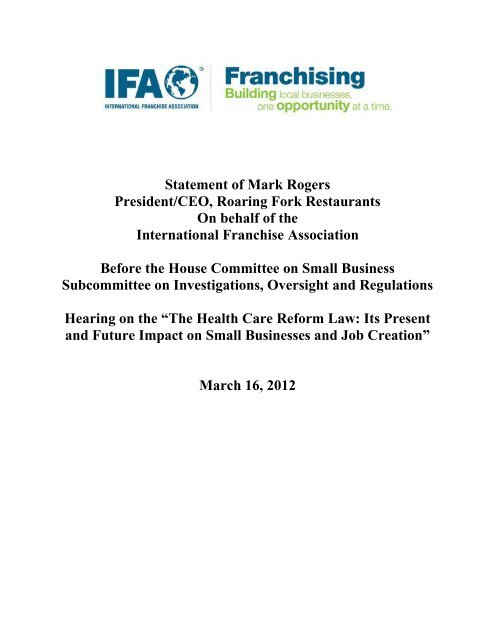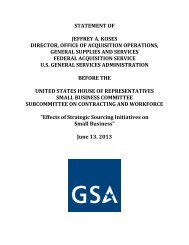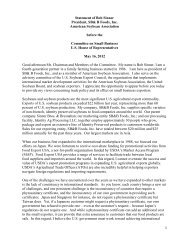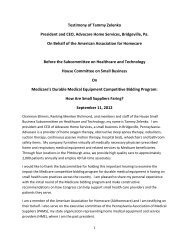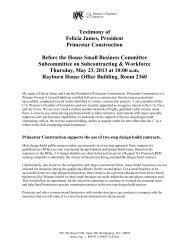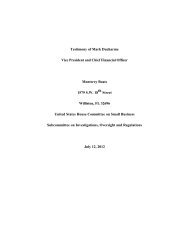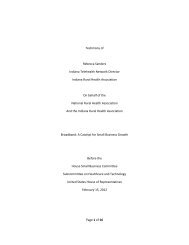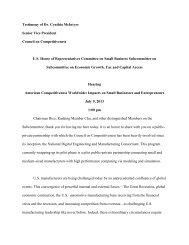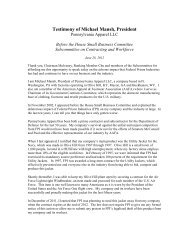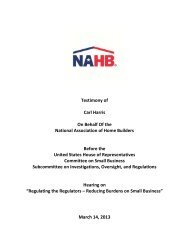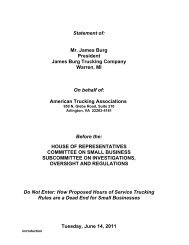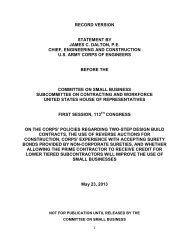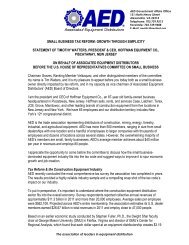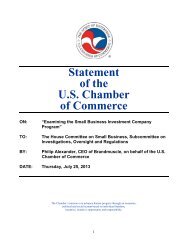Statement of Mark Rogers President/CEO, Roaring Fork Restaurants ...
Statement of Mark Rogers President/CEO, Roaring Fork Restaurants ...
Statement of Mark Rogers President/CEO, Roaring Fork Restaurants ...
You also want an ePaper? Increase the reach of your titles
YUMPU automatically turns print PDFs into web optimized ePapers that Google loves.
<strong>Statement</strong> <strong>of</strong> <strong>Mark</strong> <strong>Rogers</strong><br />
<strong>President</strong>/<strong>CEO</strong>, <strong>Roaring</strong> <strong>Fork</strong> <strong>Restaurants</strong><br />
On behalf <strong>of</strong> the<br />
International Franchise Association<br />
Before the House Committee on Small Business<br />
Subcommittee on Investigations, Oversight and Regulations<br />
Hearing on the “The Health Care Reform Law: Its Present<br />
and Future Impact on Small Businesses and Job Creation”<br />
March 16, 2012
Good morning Chairman C<strong>of</strong>fman. My name is <strong>Mark</strong> <strong>Rogers</strong>, and I am grateful for the<br />
opportunity to address some <strong>of</strong> the ramifications the new health care law will have on employers<br />
and the workforce, particularly the impacts the new law will have on small businesses and job<br />
creation.<br />
While this law includes some important insurance reforms that increase access to<br />
coverage for many people, taken as a whole, the law is biased towards mandating coverage<br />
rather than providing meaningful cost control. Over the next several years, this legislation will<br />
create increased uncertainty in our long term business planning and force employers to choose<br />
between absorbing rising premiums or paying mandated penalties. This will ultimately slow or<br />
stall the growth <strong>of</strong> small and midsized businesses as we struggle with the costly new<br />
requirements during a time <strong>of</strong> economic recovery.<br />
I am a small business owner and franchise partner for Cheddar's Casual Cafe, the<br />
company my father originally co-founded in 1978, where he envisioned an inviting<br />
neighborhood restaurant <strong>of</strong>fering handmade, high quality food at a reasonable price. Now, along<br />
with my father and sister I have started a pair <strong>of</strong> companies called <strong>Roaring</strong> <strong>Fork</strong> <strong>Restaurants</strong>,<br />
Inc., to expand Cheddar's franchises across the state <strong>of</strong> Colorado, and Riverside Restaurant<br />
Group, LLC which facilitates the purchase and construction <strong>of</strong> restaurant properties.<br />
Our first Cheddar’s franchise restaurant is in Aurora, and our second is in Colorado<br />
Springs. We are truly building this business from the ground up. I have worked as a cook,<br />
assistant manager, and general manager at Cheddar’s to get a true feel for the operations and<br />
learn more about restaurant management. As we look to continue our franchise expansion across<br />
the state, I am particularly concerned about the health care employer mandate, which may<br />
prohibit or hamper our growth.
I am here today on behalf <strong>of</strong> the International Franchise Association (IFA). As the<br />
largest and oldest franchising trade group, the IFA’s mission is to safeguard the business<br />
environment for franchising worldwide. IFA represents more than 90 franchised industries,<br />
including more than 11,000 franchisees, 1,100 franchisors and 500 supplier members<br />
nationwide. According to a study conducted for the IFA Educational Foundation, there are more<br />
than 800,000 franchised establishments in the U.S., creating 18 million American jobs and<br />
generating $2.1 trillion in economic output each year.<br />
According to a study prepared for the IFA by the Hudson Institute, the franchise industry<br />
will be particularly hard hit by the employer mandate provision <strong>of</strong> the new health care law. The<br />
mandate will add costs and regulatory burdens by subjecting small business owners to a penalty<br />
<strong>of</strong> $2,000 per full-time worker for businesses with over 50 employees if they choose not to cover<br />
all employees. The law further confines workplace flexibility by defining a full-time employee as<br />
one who works at least a four day per week schedule. Additionally, small businesses will also be<br />
required to calculate on a monthly basis the variable schedules <strong>of</strong> hourly employees to determine<br />
requirements under the new law and the associated penalties, adding in burdensome compliance<br />
time and costs.<br />
According to the Hudson Institute report, the new law will affect tens <strong>of</strong> thousands <strong>of</strong><br />
franchise businesses like mine, putting more than 3.2 million full-time employees earning their<br />
living in franchised businesses at risk <strong>of</strong> losing their jobs and adding costs <strong>of</strong> more than $64<br />
billion in employer mandate penalties, not including the additional cost and time <strong>of</strong> regulatory<br />
compliance.<br />
The report also shows that the franchise industry will be particularly hard hit because the<br />
new law will make it harder for small businesses with 50 or more employees to compete with
those that have fewer than 50 employees. The law discourages franchisees like me from<br />
expanding and owning multiple locations. Therefore, the effects <strong>of</strong> the new law are anti-small<br />
business growth, by inadvertently discouraging many franchisees from owning and operating<br />
multiple locations, creating a competitive disadvantage for franchisees who do own more than<br />
one or two locations, and barriers to entrepreneurs who are looking to capitalize on the franchise<br />
business model to grow their business and hire more workers.<br />
The study also demonstrates that the employer mandate provides an incentive for<br />
franchisors and franchisees to replace current fulltime workers with part-time and temporary<br />
workers. This is the wrong direction for both our economy and for millions <strong>of</strong> unemployed<br />
Americans. The real irony here is that in the name <strong>of</strong> expanding health care coverage, Congress<br />
and the administration are making it more difficult for workers to enter and eventually be<br />
promoted in the workforce at a time when we need job growth.<br />
Another piece <strong>of</strong> the Hudson Institute study focuses particularly on multi-unit<br />
franchisees, like me, that own and operate more than half <strong>of</strong> the nation’s franchised<br />
establishments. When a franchisor or franchisee employs 50 or more persons at several locations,<br />
it must compete against independent establishments with fewer than 50. The study shows that if<br />
our businesses choose not to <strong>of</strong>fer health insurance when it becomes mandatory in 2014, we<br />
could face more than $3.5 billion in penalties. In particular, some sectors such as the restaurant<br />
industry, which has a large number <strong>of</strong> multi-unit franchisees like me, will be affected by<br />
penalties approaching $2 billion.<br />
The new law imposes yet another unnecessary layer <strong>of</strong> regulatory burden on business<br />
owners as we attempt to understand and comply with these new provisions and face the<br />
increasing cost <strong>of</strong> doing business. Because <strong>of</strong> the employer mandate it will be more difficult for
usinesses to estimate the costs to expand and hire new workers for tens <strong>of</strong> thousands <strong>of</strong> business<br />
owners already struggling to also recover from the deepest recession since the Great Depression.<br />
Franchise small business owners should not be forced to choose between absorbing rising<br />
insurance premiums and paying tax penalties for non-compliance. The framework <strong>of</strong> the current<br />
law threatens the economic viability and job creation potential <strong>of</strong> franchised businesses vying to<br />
recover from the economic downturn by imposing excessive cost burdens onto the backs <strong>of</strong> small<br />
business. As one <strong>of</strong> those small business owners, I urge Congress to further review the impacts<br />
and consequences <strong>of</strong> the health care reform law as a whole and to repeal this onerous employer<br />
mandate provision.


